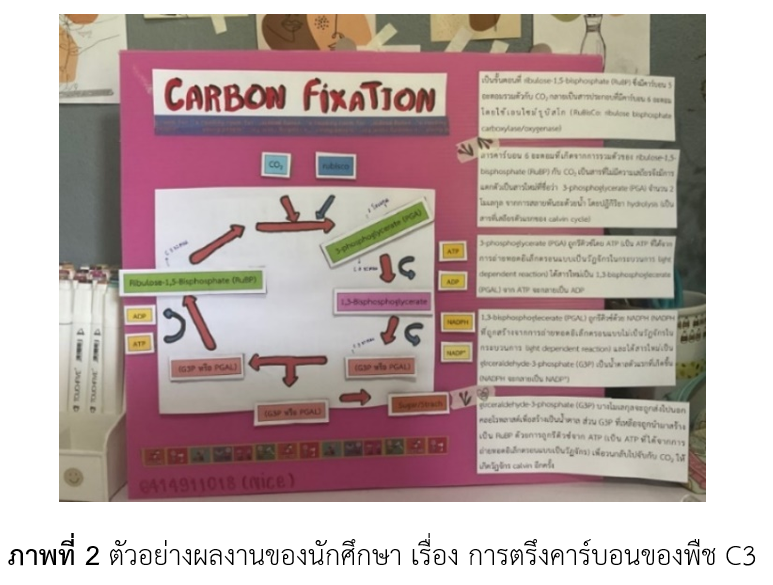การพัฒนาแนวคิดวิทยาศาสตร์ เรื่อง การสังเคราะห์ด้วยแสง สำหรับนักศึกษาครูสาขาชีววิทยาด้วยการจัดการเรียนรู้รูปแบบ 5B model ภายใต้สถานการณ์การแพร่ระบาดของโควิด-19
Main Article Content
บทคัดย่อ
งานวิจัยในครั้งนี้มีวัตถุประสงค์เพื่อพัฒนาแนวคิดวิทยาศาสตร์ เรื่อง การสังเคราะห์ด้วยแสง ด้วยการจัดการเรียนรู้รูปแบบ 5B model และศึกษาเจตคติที่มีต่อการจัดกิจกรรมการเรียนรู้รูปแบบ 5B model ในรูปแบบการเรียนการสอนออนไลน์ กลุ่มที่ศึกษาเป็นนักศึกษาหลักสูตรครุศาสตรบัณฑิต สาขาชีววิทยา ปีการศึกษา 2564 จำนวน 22 คน เครื่องมือที่ใช้ในการวิจัย คือ แผนบริหารการสอนเรื่อง การสังเคราะห์ด้วยแสง จำนวน 4 แผน แบบวัดแนวคิดวิทยาศาสตร์เรื่อง การสังเคราะห์ด้วยแสง จำนวน 15 ข้อ แบบบันทึกการเรียนรู้ของนักศึกษา แบบบันทึกหลังสอนของอาจารย์ วิเคราะห์ข้อมูลโดยการนับความถี่ของกลุ่มคำตอบและหาค่าร้อยละและการวิเคราะห์เนื้อหา ผลการวิจัยพบว่า 1) นักศึกษาหลักสูตรครุศาสตรบัณฑิต สาขาชีววิทยามีแนวคิดวิทยาศาสตร์ถูกต้องหลังเรียนสูงกว่าก่อนเรียนในทุกแนวคิด 2) นักศึกษามีเจตคติที่ดีต่อการเรียน โดยนักศึกษาส่วนใหญ่แสดงความเห็นว่า กิจกรรมทำให้นักศึกษาได้มีส่วนร่วมแม้จะเป็นการเรียนออนไลน์ กิจกรรมช่วยให้เข้าใจและจดจำเนื้อหาได้มากขึ้น กิจกรรมทำให้เกิดปฏิสัมพันธ์กับอาจารย์และเพื่อนในชั้นเรียน การสุ่มเรียกชื่อเพื่อตอบคำถามทำให้จดจ่อกับการเรียน การทำกิจกรรมช่วยทำให้เกิดความคิดสร้างสรรค์ ผ่อนคลาย ไม่เครียดจากการเรียนในรูปแบบการเรียนการสอนออนไลน์ และได้ค้นคว้าหาความรู้ด้วยตนเอง
Article Details

อนุญาตภายใต้เงื่อนไข Creative Commons Attribution-NonCommercial-NoDerivatives 4.0 International License.
วารสารวิทยาศาสตร์และวิทยาศาสตร์ศึกษา (JSSE) เป็นผู้ถือลิสิทธิ์บทความทุกบทความที่เผยแพร่ใน JSSE นี้ ทั้งนี้ ผู้เขียนจะต้องส่งแบบโอนลิขสิทธิ์บทความฉบับที่มีรายมือชื่อของผู้เขียนหลักหรือผู้ที่ได้รับมอบอำนาจแทนผู้เขียนทุกนให้กับ JSSE ก่อนที่บทความจะมีการเผยแพร่ผ่านเว็บไซต์ของวารสาร
แบบโอนลิขสิทธิ์บทความ (Copyright Transfer Form)
ทางวารสาร JSSE ได้กำหนดให้มีการกรอกแบบโอนลิขสิทธิ์บทความให้ครบถ้วนและส่งมายังกองบรรณาธิการในข้อมูลเสริม (supplementary data) พร้อมกับนิพนธ์ต้นฉบับ (manuscript) ที่ส่งมาขอรับการตีพิมพ์ ทั้งนี้ ผู้เขียนหลัก (corresponding authors) หรือผู้รับมอบอำนาจ (ในฐานะตัวแทนของผู้เขียนทุกคน) สามารถดำเนินการโอนลิขสิทธิ์บทความแทนผู้เขียนทั้งหมดได้ ซึ่งสามารถอัพโหลดไฟล์บทความต้นฉบับ (Manuscript) และไฟล์แบบโอนลิขสิทธิ์บทความ (Copyright Transfer Form) ในเมนู “Upload Submission” ดังนี้
1. อัพโหลดไฟล์บทความต้นฉบับ (Manuscript) ในเมนูย่อย Article Component > Article Text
2. อัพโหลดไฟล์แบบโอนลิขสิทธิ์บทความ (Copyright Transfer Form) ในเมนูย่อย Article Component > Other
ดาวน์โหลด ไฟล์แบบโอนลิขสิทธิ์บทความ (Copyright Transfer Form)
เอกสารอ้างอิง
Bimbola, O. and Daniel, O. (2010). Effect of constructivist-based teaching strategy on academic performance of students in integrated science at the junior Secondary school level. Educational Research and Reviews, 5(7), 347–353.
Cakir, H. (2008). Constructivist approaches to learning in science and their implications for science pedagogy: A literature review. International Journal of Environmental and Science Education, 3(4), 193-206.
Haidar, A. H. (1997). Prospective chemistry teachers’ conceptions of the conversation of matter and related concepts. Journal of Research in Science Teaching, 34(2), 181–197.
Halim, A. S., Finkenstaedt-Quinn, S. A., Olsen, L. J., Gere, A. R. and Shultz, G. V. (2018). Identifying and remediating student misconceptions in introductory biology via writing-to-learn assignments and peer review. CBE - Life Sciences Education, 17(2), 1-18.
Luoga, E. N., Ndunguru, A. P. and Mokma, L. S. (2013). High school student’ misconceptions about colligative properties in chemistry. Tanzania Journal of Natural and Applied Sciences, 4(1), 575–81.
Macdonald, G. (2012). Teaching critical and analytical thinking in high school biology. American Biology Teacher, 74(3), 178-181.
Michael, M. (2020). Coronavirus school closures: dozens of Australian private schools move to online learning. Retrieved 13 July 2021, from The Guardian: https://www.theguardian.com/australia-news/2020/mar/17/coronavirus-school-closures-dozens-ofaustralian-private-schools-move-to-online-learning.
Ministry of Education. (2017). Indicators and concepts in science subject (revision B.E. 2560) according to basic education core curriculum B.E. 2551 (in Thai). Bangkok: Chumnumsahakorn Karnkaset.
National Research Council [NRC]. (2000). Inquiry and the National Science Education Standards: A Guide for Teaching and Learning. Washington, DC: National Academy.
Onyema, E M., Eucheria, N. C., Obafemi, F. A., Sen, S., Atonye, F. G., Sharma, A. and Alsayed, A. O. (2020). Impact of Coronavirus pandemic on education. Journal of Education and Practice, 11(13), 108-121.
Pattamapongsa, A. (2012). The development of high school student’s conception of photosynthesis and views of nature of science using inquiry-based/explicit NOS approach. Master’s Thesis. Bangkok: Kasetsart University.
Phueaknumpol, V., Rujiranukul, P., Karnchanawong, R., Kanjarean, K., Rungsiri, A., Wongchaochan, P. and Jareanwong, S. (2020). A development of Rambhai Barni Rajabhat University students’ learning outcomes under the qualifications framework for higher education by using 5B model. Proceedings of 13th Rambhai Barni Rajabhat University Research Conference (pp. 51-61). 19 December 2019. Chanthaburi. Rambhai Barni Rajabhat University.
Pokhrel, S. and Chhetri, R. (2021). A literature review on impact of COVID-19 pandemic on teaching and learning. Higher Education for the Future, 8(1), 133-141.
Prasertsan, S. (2012). Research-based project: New learning process for Thai education. Bangkok.
Sutthiwattana, P., Koolrojanapat, S., Akkasriworn, N., Sripanomtanakorn, S., Somboon, L., Kerdthong, A. and Wareebor, J. (2019). A study of the development level of learning in accordance with the national higher education standards framework (TQF) by using teaching styles in subjects that emphasize lectures of undergraduate students of Rambhai Barni Rajabhat University (in Thai). Humanities and Social Sciences Journal, Ubon Ratchathani Rajabhat University, 10(2), 295-304.
Tadesse, S. and Muluye, W. (2020). The impact of COVID-19 pandemic on education system in developing countries: A review. Open Journal of Social Sciences, 8, 159-170.
Toraman, C. and Demir, E. (2016). The effect of constructivism on attitudes towards lessons: A meta–analysis study. Eurasian Journal of Educational Research, 62, 115-142.
Udomsin, C. and Porntrai, S. (2017). Developing academic achievement in learning cell cycle and mitosis using a hand-on activity of science inquiry (in Thai). Journal of Research on Science, Technology and Environment for Learning, 8(2), 326-340.
Wayo, W., Charoennukul, A., Kankaynat, C. and Konya, J. (2020). Online learning under the COVID-19 Epidemic: Concepts and applications of teaching and learning management (in Thai). Regional Health Promotion Center 9 Journal, 14(34), 285-298.


